Popular
- Manage License (Add on)
- Bulk Revoke
- Generating Access Code
- Direct Distribution (Add On)
- Creating Single User or Multiple Users (Bulk Upload)
- Admin Center and Profile and Settings
- Revoking Content
- Distributing Content
- Signing in to Kitaboo
- Promote User/Transfer
- Create Class/Update Class
- Selective Oneroster Sync with API/ZIP/SFTP
- Analytics Dashboard and Reports Overview
- How Kitaboo Reader – Text-to-Speech (TTS) Works
- Activated User – Definition & Billing Policy
- Understanding User Roles: Producer vs. Admin
- Auto Book Deletion Process
- Adding group with SAML
- Syncing Data with Clever
- Selective Oneroster Sync with API/ZIP/SFTP
- Syncing Data with PowerSchool
- Syncing Data with OneRoster
- Adding a Group
- Searching a Customer
- Issuing Licenses
- Editing a Customer
- Deactivating a Customer
- Adding a Google Classroom Customer
- Adding a OneRoster Customer
- Adding One roster 1.2
- Adding a LTI 1.3 Customer with OneRoster
- Adding a LTI 1.3 Customer
- Adding an LTI 1.1 Customer with OneRoster
- Adding LTI 1.1 Customers
- Sorting Customer and Group
- Enable K-AI at the content level
- Content Lifecycle Stages in Kitaboo for eBooks
- Creating a Fixed-layout Kitaboo eBooks
- Creating Fixed-layout ePub 3.0
- Upload 3rd Party ePub 2.0/3.0
- Creating a Course or Uploading Scorm
- Activity or Gradable Activity Creation
- Authoring an ePub
- Creating a Video Book
- Creating an Audio Book
- Updating the Cover Image
- Editing a Fixed eBook
- Deleting and Deactivating Content
- Users Tab
- How to Edit and Delete a Category
- Clever Integration
- Classlink Integration
- Canvas LTI Integration
- Admin Center
- Analytics Tab
- Adding a Customer
- Creating Admin Accounts
- Q1. How can I get help with a specific service?
- Q2. How do I report bugs or request service enhancements?
- Q3. As the main institute admin, if I revoke or delete a user created using an access code, can the same access code be reused? What will be the expiry period for that access code’s content?
- Q4. As a main institute admin, can I change the password(s) of institute(s) associated with my account?
- Q5. Why is my Customer ID and Password not working?
- Q6. As a main group admin, can I change the password(s) of groups (sub-admin) associated with my account?
- Q7. How can I redeem an access code?
- Q8. What is a common access code?
- Q9. While distributing content to all classes in one go, how does a user know if he/she has been assigned content?
- Q10. While distributing content, can I restrict access to it to teachers only?
- Q11. What are the prerequisites for adding a user to an existing class?
- Q12. Can I create a class with students only?
- Q13. How can I create multiple users on the Kitaboo system?
- Q14. Why is my Group ID and Password not working?
- Q15. I forgot my password. How do I reset it?
- Q16. How do I log in to the Kitaboo portal/Reader?
- Q17. How can I search for a Custom Order ID while assigning content or a collection in the Institute/Customer login?
- Q18. How to add a custom order ID to a new order or an Existing order?
- Q19. What is the API update process, how are changes communicated, and what is the support period for deprecated features?
- Q20. What is the notification process for product release notifications, product issues (discovered by Kitaboo), and product outage/downtime notifications?
- Q21. Why are some symbols not displaying correctly in my eBook or why is the file failing during the conversion process?
- Q22. Does Kitaboo support the Chinese language?
- Q23. What types of quiz activities does Kitaboo support?
- Q24. What is the file size limit supported in Kitaboo?
- Q25. What happens if I do not provide a Table of Contents (TOC) sheet during the bulk upload process in Kitaboo?
- Q26.How does the Multiple Admin Edit feature work, and what are its limitations?
- Q27.How to Update Widgets/Activities in Kitaboo After New Fixes or Enhancements Are Deployed ?
- Q28. Print Configuration in Kitaboo Reader.
- Q29. Glossary Instructions Guide (Kitaboo Fluid 360)
- Q30. WCAG 2.2 Compliance – Reader and Content Responsibilities
- Q31. Keyboard Shortcuts for Table and TOC Management in Author (Kitaboo Fluid 360)
- Help Screen: Your Personal Guide
- Easy Steps to Create or Upload a Cover Page
- Creating a structured Table of Contents (TOC)
- Choosing the Perfect Layout
- #1. Add content using the Authoring
- 1.1. Title: A Simple Way to Add Clear, Catchy Headings!
- 1.2. Explore the smart “Header” Element!
- 1.3. Discover the Power of Text in Authoring!
- 1.4. Make Your Pages Come to Life with Images!
- 1.5. Add Engaging Videos to Your Pages!
- 1.6. Add Engaging Sounds to Your Pages
- 1.7. Explore HTML Interactivity!
- 1.8. Organize your data with the Table element!
- 1.9. Callout Box: A Handy Way to Highlight Important Information!
- #2. Explore Fun and Interactive Widgets with the Authoring Platform
- 2.1. Multiple Choice activity
- 2.2. Create Engaging Presentations with the Slideshow Component!
- 2.3. Image Labelling: Make Your Pictures Interactive!
- 2.4. Fill in the Blanks: Fun and Interactive Learning!
- 2.5. Highlighter: Your Handy Tool for Highlighting Important Text!
- 2.6. Correction Element: Make Learning Fun and Interactive!
- 2.7. Sorting Component – Organize with Ease!
- 2.8. Match the Pairs: An Interactive Learning Tool!
- 2.9. Easy-to-Use Sidebar for Your Content
- 2.10. Click to Reveal activity – Making Learning Fun!
- 2.11. Explore the Fun World of Wordsearch
- 2.12. Discover the Flashcard Element for Your Learning Journey!
- 2.13. Explore the “Group Activity” Element
- 2.14. Discover the Fun of Categorizing with the “Categorize” widget
- 2.15. Explore the Question and Answer Activity
- #3. Unlock the Power of Gradable Activities in Kitaboo’s Authoring Platform
- 3.1. Creating a Gradable Activity
- 3.2. Adding a Gradable Activity in an eBook
- 3.3. Students Accessing the Activities
- 3.4. Standalone Gradable Activity
- 3.5. Grade Assessment: Activity Management for Admins and Teachers
- 3.6. Customizable Certificates for Course Completion
- #4. K.AI: Transforming Content Creation with AI-Driven Interactivity
- 4.1. K.AI Automatic Quiz Generation from PDF
- 4.2. Automatic Generation of Quiz from PDF Using K.AI Markup
- Kitaboo 6.0 Reader Accessibility Help Manual
- Login to Kitaboo Reader
- How to use Access Code
- Bookshelf Overview
- Bookshelf Search in Kitaboo Reader
- Guide to view Fixed Layout Ebooks
- Guide to view Reflowable ePUBs
- Guide to view VideoBooks
- Guide to view AudioBooks
- Changing Profile Settings in Reader
- Collections in Kitaboo Reader
- Viewing More Info in Kitaboo Reader
- How to add Bookmarks
- How to add Sticky Notes
- How to add Highlights
- How to use Pen Tool
- How to Access Resources
Signing in to Kitaboo
Kitaboo’s Studio Portal empowers you to create, publish and securely distribute your digital content in multiple formats to your customers. It also empowers you to manage and track your customers. The portal supports content in three popular languages namely English, German, and Spanish and is a leading platform for education and online training.So if you represent a group of educational institutions or a corporate house, what are you waiting for!
Be a part of our customer-driven environment and enjoy our delightful productswith a simple, honest pricing.
Login as District Administrator
Go to the Institute Administrator Portal:
Enter your Email Address
1.1: Navigate to the Kitaboo Studio Reader login page and enter your Group Admin login credentials.
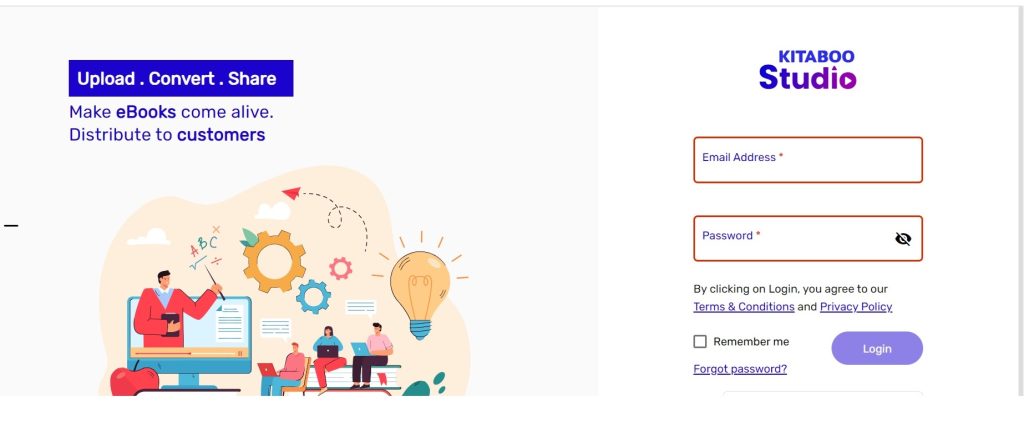
1.2: Select your preferred language > Click on Login.
NOTE: English is the default login language
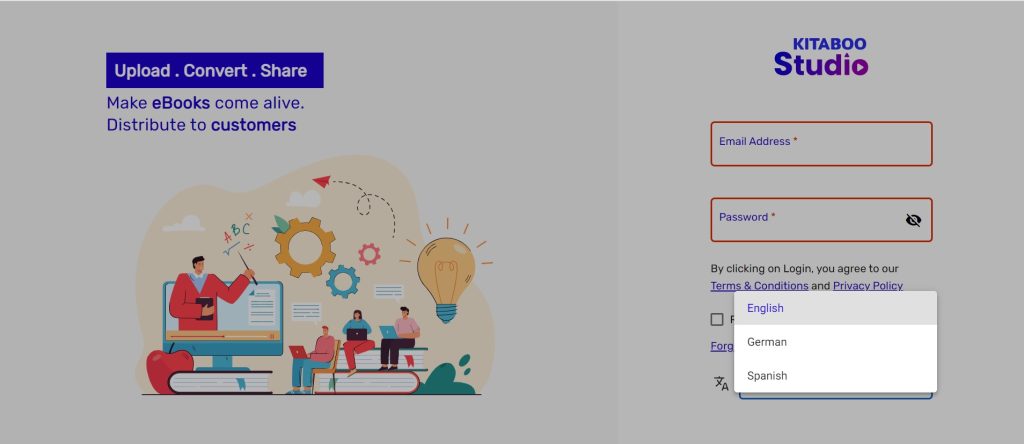
1.3: This is a dashboard where you can distribute content, perform user creation, class creation, analytics (for classes, users, content, and collection), and customers/schools/partners/institutes related to that group .
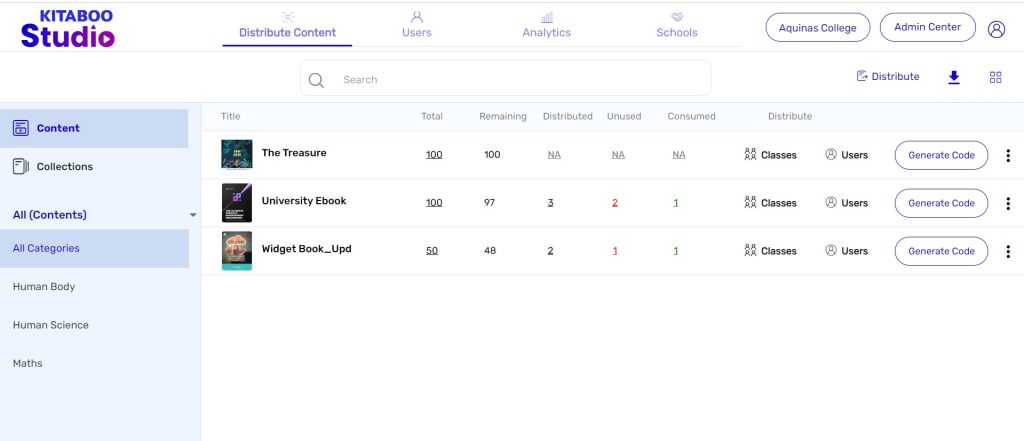
1.4: This is a dropdown where you can see the all associated school/partners
/institutes/customers related to that group.
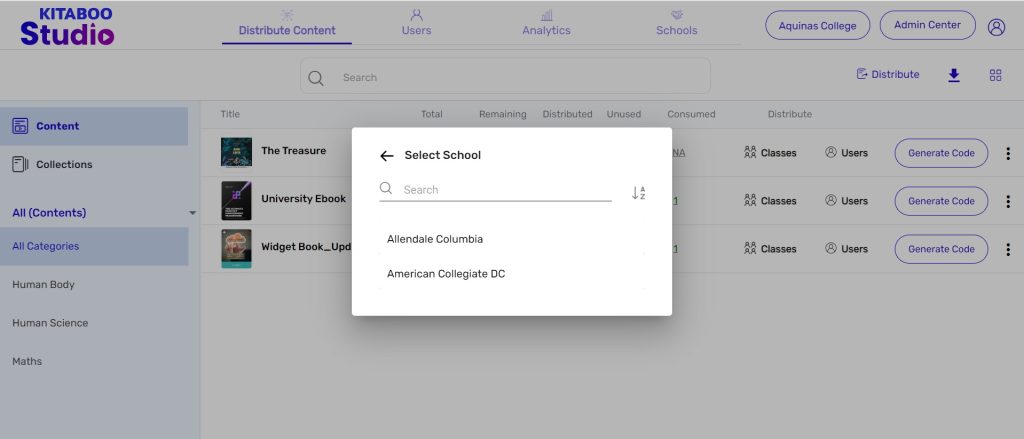
1.5: This is a school dashboard page where we can see the list of schools/partners
/institutes/customers.
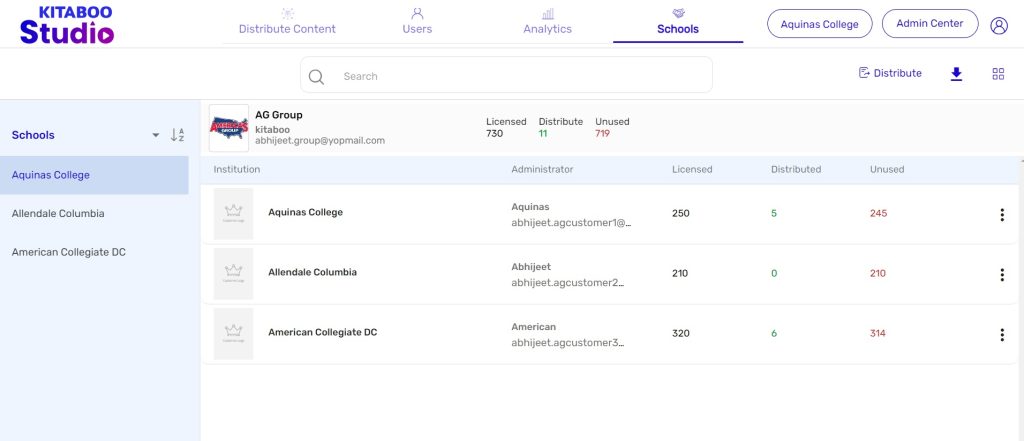
Know the Buttons and Links on the Kitaboo UI
The Distribute Content Tab
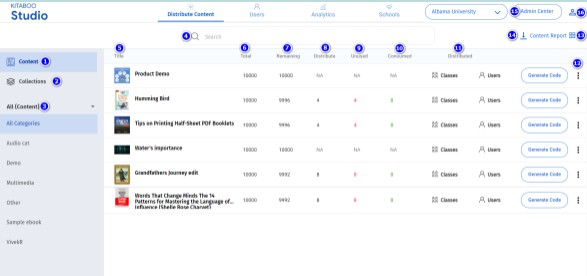
1. Content – Lists all the available content on the Kitaboo system.
2. Collections – Lists all the available collections (a few pieces of content grouped
together) on the Kitaboo system.
3. All (Content)– Lists all the available content based on their types or categories,
like eBook, ePub, SCORM, audio book, video book etc.
4. Search – Lets you do a quick search of content by its name.
5. Titles – Displays names of the titles on the Kitaboo system.
6. Total – Defines the total number of licenses issued.
7. Remaining – Defines how many of the issued licenses are still available for
distribution.
8. Distribute – Defines the number of licenses that have already been distributed.
9. Unused – Defines the number of licenses still to be used or consumed by users.
10. Consumed – Defines the number of licenses already used or consumed by
users.
11. Distribute – Lets you select whether you want to distribute content to a class or
a user.
12. More Options Icon – Lets you discover more information about a view the
access code report for a content.
13. Toggle View – Enables you to select the way you want to view the list of content
– whether in the form of a simple list or as a grid with thumbnails for the listed
content.
14. Content Report – Enables you to download a report on the usage of content
comprising information like total number of licenses, number of remaining,
distributed, unused, and consumed licenses.
15. Admin Center – Lets the main group admin view or edit the profile including the
password or add a sub-group admin user.
16. Profile and Settings – Lets you manage your profile, view a few video tutorials,
access the Kitaboo platform help guide, and know about the platform privacy
policies and terms and conditions.
The Users Tab: Users
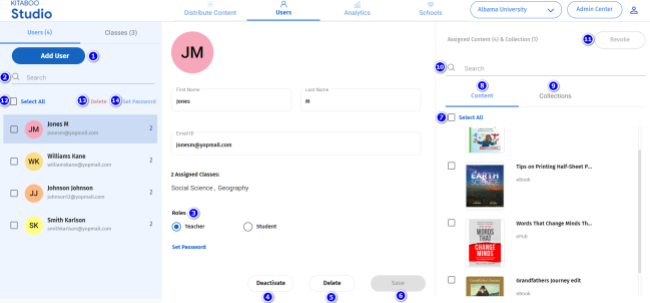
1. Add User – Enables you to add a new user or multiple users to the Kitaboo system.
2. Search – Enables you to do a quick search of an existing user.
3. Roles – Lets you define the role of the to-be-added user – whether a teacher or a
student.
4. Deactivate – Enables you to deactivate or suspend an existing user. A deactivated user exists on the Kitaboo system, but will not be able to access content until he/she remains deactivated. He/she can be restored.
5. Delete – Enables you to delete or remove a user from the Kitaboo system. A deleted user cannot be restored.
6. Save – Lets you save the edits.
7. Select All – Lets you select all the listed pieces of content/collections if you want to revoke all of them from a user.
8. Content – Displays a list of content assigned to a user.
9. Collections – Displays a list of collections assigned to a user.
10. Search – Enables you to do a quick search of a content or a collection.
11. Revoke – Enables you to revoke the selected pieces content or collections from access by a user.
The Users Tab: Class
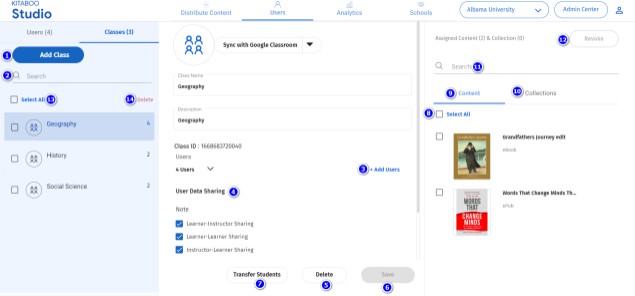
1. Add Class – Enables you to add a new class to the Kitaboo system.
2. Search – Enables you to do a quick search of an existing class.
3. Add Users – Lets you add new users to an existing class .
4. User Data Sharing – Lets you define the data like notes and highlights sharing options by selecting the relevant checkboxes.
5. Delete – Enables you to delete or remove an existing class from the Kitaboo system. A deleted class cannot be restored.
6. Save – Lets you save the edits.
7. Transfer Student – Enables you to transfer the students from one class to another
class.
8. Select All – Lets you select all the listed pieces of content/collections if you want to revoke all of them from a class.
9. Content – Displays a list of content assigned to a class.
10. Collections – Displays a list of collections assigned to a class.
11. Search – Enables you to do a quick search of a content or a collection.
12. Revoke – Enables you to revoke the selected pieces content or collections from access by a class.
13. Select all – Lets you select all the listed classes if you want to select all of them/few of them from the class list.
14. Delete Selected Class- Lets you delete all the listed classes if you want to delete all of them/few of them from the class list.
